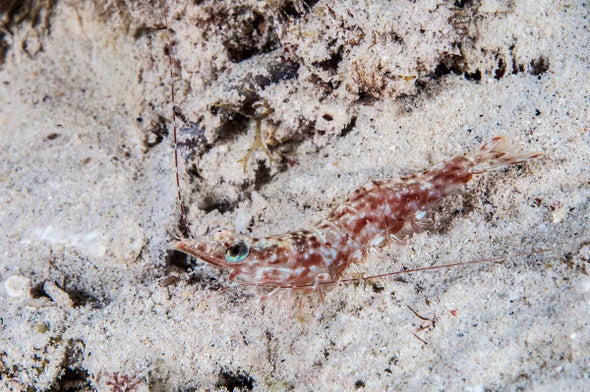This is Scientific American's 60-second Science, I'm Annie Sneed.
(CLIP: Snapping shrimp sound)
Rice Krispies? Rain hitting a tin roof? Bacon frying? How about noisy creatures known as snapping shrimp.
Warm temperate and tropical coastal waters around the world are teeming with these noisy little creatures. They snap their claws so fast that they produce a bubble. When the bubble bursts, it makes a loud popping sound.
"It's this sort of persistent background noise, these snapping shrimp kind of crackling."
Aran Mooney, a marine biologist at Woods Hole Oceanographic Institution.
The shrimp produce the loud sound to stun prey. So how would this shrimp be affected by oceans getting warmer in coming years? To find out, Mooney and his colleague Ashlee Lillis analyzed audio recordings of the critters in their natural environment.
They also performed lab experiments with snapping shrimp collected from the wild, in water of varying temperatures. And they found that when water heats up, the shrimp start snapping more—and the water's soundscape gets louder. They shared their findings in February at the Ocean Sciences Meeting 2020 in San Diego.
The researchers aren't sure what's causing this change in shrimp behavior—but they have an idea.

"We don't precisely know the mechanism of why they're snapping more often. What we think is that these guys are basically just ectothermic animals. So that means they're directly responding to environmental conditions around them. So basically, as you increase the water temperature, it increases their metabolic rate—they get more metabolically active, so they are able or trying to snap more."
If these shrimp do make the ocean noisier as the climate warms, it could be a problem for both marine creatures and humans. Many ocean animals use sound to communicate. And both the Navy and fishermen rely on marine acoustics to do their work.
"You know, we never really thought about how that ocean background noise or its own fog is sort of naturally increasing, in what we think is temperature driven or climate change driven. So as you raise those levels, it gets harder to kind of 'see' through that acoustic fog."
Thanks for listening for Scientific American — 60-Second Science. I'm Annie Sneed.












